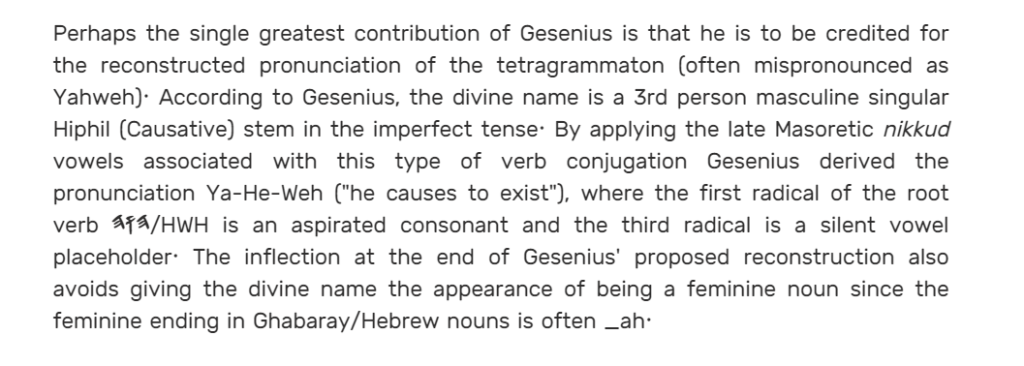Heinrich Friedrich Wilhelm Gesenius was born February 17, 1786, Nordhausen, Hanover, and died October 23, 1842, Halle, Prussia. Gesenius was a German biblical critic and the father of Hebrew lexicography and grammar, as well as an important figure in other Semitic language studies. Gesenius was educated at Helmstedt and at Gottingen. In 1811 he became professor of theology at the University of Halle.
All of the modern Hebrew lexicons and Hebrew grammar books recycle Gesenius. His Hebrew grammar which appeared in 1815 in German was translated into English, edited, and enlarged by E. Kautzsch. The 2nd English edition was revised by A. E. Cowley in 1910. A Hebrew and English Lexicon of the Old Testament, based on the lexicon of Gesenius, as translated by Edward Robinson, was edited by Francis Brown with the co-operation of S. R. Driver and Charles A. Briggs in 1906, and was reprinted by several other publishers. Generations of Semitic scholars have relied on Gesenius’ work, and his contributions have been kept alive into the 21st century by various editions and translations.

Perhaps the single greatest contribution of Gesenius is that he is to be credited for the reconstructed pronunciation of the tetragrammaton (often mispronounced as Yahweh). According to Gesenius, the divine name is a 3rd person masculine singular Hiphil (Causative) stem in the imperfect tense. By applying the late Masoretic nikkud vowels associated with this type of verb conjugation Gesenius derived the pronunciation Ya-He-Weh (“he causes to exist”), where the first radical of the root verb הוה/HWH is an aspirated consonant and the third radical is a silent vowel placeholder. The inflection at the end of Gesenius’ proposed reconstruction also avoids giving the divine name the appearance of being a feminine noun since the feminine ending in Ghabaray/Hebrew nouns is often _ah.
Gesenius must therefore also be credited, inadvertently, for being the inspiration for other much more recent reconstructed pronunciations of the tetragrammaton such as Ya-Ha-Wah, Ye-Ho-Wah, and Ya-Hu-aH. Although these forms feminize the name, they nonetheless follow the same rules Gesenius used to come up with Ya-He-Weh because the medial H in these forms is voiced. Hence they are still Gesenius-type reconstructions but with different vowels. A rose by any other name is still a rose.
Although Gesenius was accused and exposed for being a member of the Masonic order, a conflict with the church given that Freemasonry deifies rationalism, he was not dismissed from his theological professorship at the University of Halle and he remained at his post for the rest of his life. The University of Halle now has a research centre dedicated to the promotion of Freemasonry, Radical Enlightenment, Esotericism, and Illuminaten studies.
In A. G. Mackey’s An Encyclopedia of Freemasonry (1916), Gesenius is repeatedly cited for the definition and etymology of Hebrew words, as if Gesenius is the sole authority of the language as far as the Masonic order is concerned.
